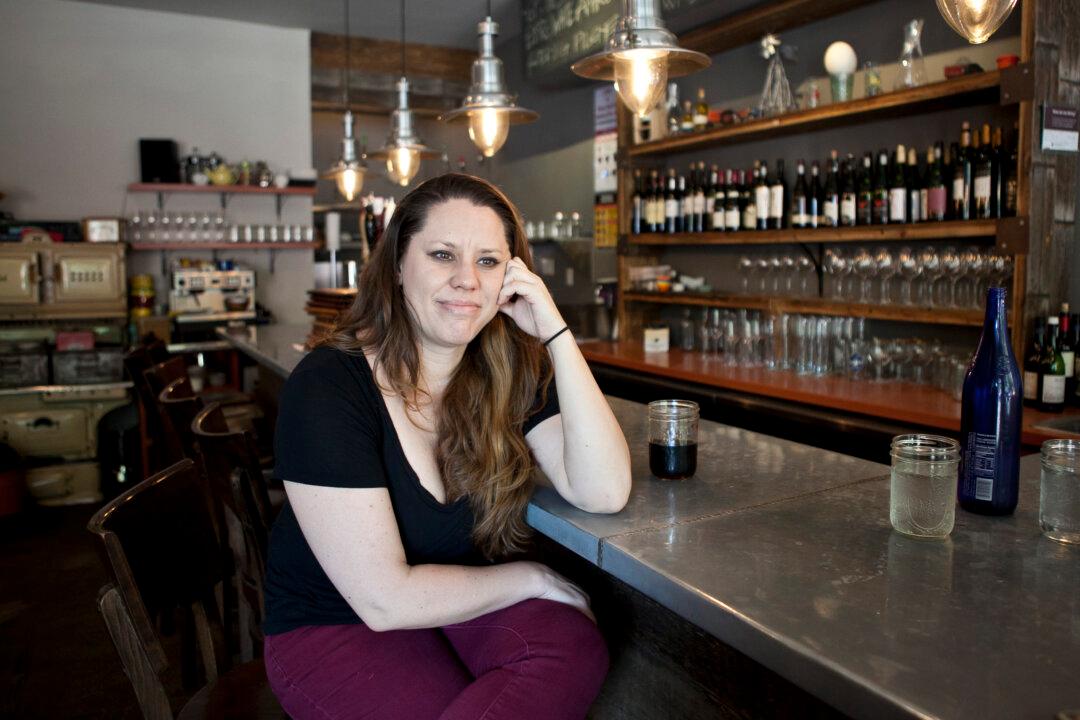NEW YORK—Suzaan Hauptfleisch arrived in New York 13 years ago, in flip-flops, during a snowstorm. She had $80 in her pocket and a conviction she would become an actress. It was a chance to start anew, to put behind memories of apartheid, farm killings, and poverty.
But she never forgot the aroma of South African wine. Nor the piquant taste of antelopes, goat legs, and wild boars.
When she scaled down her acting pursuits in 2010, Hauptfleisch remedied her homesickness by opening Kaia Wine Bar on the Upper East Side. The popular bar with a South African theme serves locally sourced, South African-inspired small plates and Southern Hemisphere New World wines.
Until recent years, Hauptfleisch never envisioned herself as a bar owner. Her lifelong dream was to act and that was what she had studied at the University of Stellenbosch in South Africa.
But as Hauptfleisch, 35, looks back on the ingredients of her life, it seems opening a wine bar was the perfect way to remember and give back to her South African roots from a concrete jungle.
People From the Land
Hauptfleisch grew up on one of the oldest farms in the Free State. Her family owned it for 250 years.
“We were people from the land,” she said. “I loved walking long distances and singing at the top of my lungs as a child.”
“We had a big farm. ... I walked through corn fields to be alone and get away from it all,” she said.
Hauptfleisch grew up during apartheid. She recalled living in perpetual fear of farm killings.
“That was always a problem in the early 1990s,” she said. “People would murder entire families on white farms.”
It was uncommon for white South African farmers to be liberals during that time, but Hauptfleisch’s family was. In 1968, Hauptfleisch’s paternal grandmother Cienie Hauptfleisch founded a school on the farm for black children.
The school had one teacher, who taught at levels from first grade to ninth grade until the family lost the farm in 1993 due to financial troubles.
But during its 25 years of existence, the school produced several students who went on to higher education and became teachers, lawyers, and doctors.
“To this day, I believe we weren’t touched because of my [family’s] name,” Hauptfleisch said.
During the apartheid years, South Africa had segregated and overpopulated hospitals.
Hauptfleisch remembered her parents used to wake at ungodly hours to take very sick black workers to hospitals to speak for them and advocate for timely care.
“It’s tough for me to talk about it actually,” she said. “It was apartheid. My father, being a liberal, got a lot of flack from white people.”
Today, Hauptfleisch has partnered with Phelophepa, a South African charity, to raise funds for South African rural communities.
Phelophepa, meaning “train of hope,” delivers medical supplies and bio-medical services through an 18-car train that travels through rural communities in South Africa.
It delivers supplies and medical services from cataract surgeries to reading glasses. It also provides optometry, dental, and psychological care.
“The fact that the train goes to the post-apartheid areas and rural areas, and what it stands for, is very important to me,” Hauptfleisch said.
Kaia Wine Bar
Kaia means “hut” in Zulu, a South African language that Hauptfleisch learned on the farm.
A decorative, antique cast-iron stove is nestled in the corner of the bar. It still holds coal from the last time it was used in the 1800s.
“I bought it in a Queens secondary store for way too much money,” Hauptfleisch said. “But I grew up on a farm using this so I love it.
“My experience in South Africa gives me a great perspective on life, on opening a business,” she said. “I have kinder ideals. I have a different sense of what’s important and what’s not.”
She recalls how there were many times when food was scarce on the farm during droughts, but her father would slaughter a cow nonetheless and divide it among the community.
“That’s why community is really important for me today,” she said. “I don’t understand how someone can have a business and not be a part of the community that pays your rent.”
Regulars stop by to say hello throughout the day, even though her bar doesn’t open until 5 p.m.
“It’s the people. They’re such loyal customers. There are people who are here every day out of the week,” she said. “That to me is the coolest thing.”
Hauptfleisch opened the restaurant with a quarter of the money she needed for it.
“It was completely a gut thing,” she said. “There’s no recipe for how to make a successful restaurant. There’s no recipe for human interaction,” she said. “Having a restaurant just seemed natural. I grew up in a farm kitchen, where you make your own jams and pickle your own stuff.”
The seasonal menu changes every four months. “That’s the way we grew up, we grew up eating what the seasons gave us,” Hauptfleisch said.
Most of her wines are served only by the glass so people can experience a greater variety of South African wine.
She is currently looking for new locations in Astoria and Brooklyn. Her other bars will run on the same rules: no bottles served and no reservations.
“I miss the ease of driving to someone’s house [in South Africa] unannounced with a bottle of wine and having a barbecue,” she said. “We don’t take reservations here because I want people to feel like they can just walk in.”




